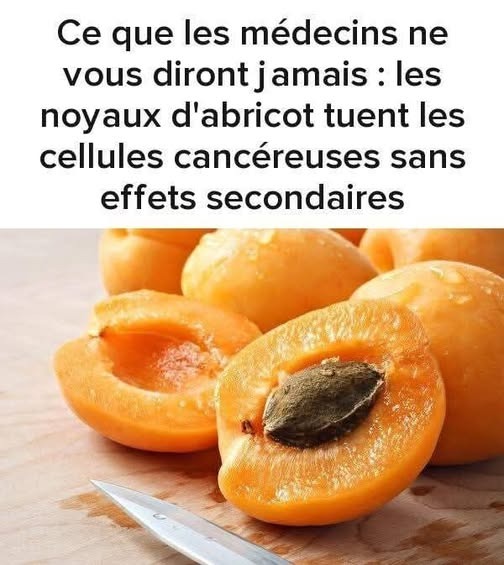ADVERTISEMENT
Apricots, peaches, and plums are not only delicious fruits, but they may also contain a vital ingredient for cancer prevention. Vitamin B17, known as laetrile and amygdalin, has been the subject of research suggesting it can both prevent and cure cancer. This remedy is concentrated in the kernel itself. And yet, unfortunately, most of us discard this kernel, thinking it's useless and inedible. What if I told you the truth about apricot kernels—that they can destroy cancer cells?
These kernels can indeed be an excellent prophylactic against cancer. How is this possible? In the book "World Without Cancer," written by Edward Griffin, he described the discovery, which dates back more than thirty years. In his book, he discusses this discovery that can cure cancer and how to do it. However, he also mentions that this brilliant discovery has simply been buried by those who want to profit from the disease. Furthermore, Edward Griffin explains that cancer often presents a disrupted metabolism in the body, and that cancer is inherently metabolic in origin. The body's metabolism is disrupted when the balance of vitamins and minerals is disrupted. Your body begins to starve without the necessary vitamins and minerals that are vital for normal internal processes, which then triggers various malfunctions in our damaged mechanisms. This is the same principle that applies to all other diseases that occur in the body.
Why is this truth about apricot kernels being concealed?
The cancer industry earns $200 billion a year, so it's no wonder effective alternative methods are hidden from the public. As Edward Griffin explains, the drug to cure and prevent cancer has existed for centuries, and it requires no human intervention to manufacture, but unfortunately, this discovery is being hidden.
So, how are apricot kernels a cure for cancer?
Apricot kernels contain a higher source of amygdalin (known as vitamin B17) than other plant sources. This ingredient has an invaluable property for the human body. It targets and kills cancer cells while strengthening the immune system, protecting it against cancer recurrence. Research has shown that a Himalayan tribe known as the "Hunza" has never had a single case of cancer due to their natural diet, which is rich in apricots. Their diet contains 200 times more vitamin B17 than a Western diet. In the Hunza culture, the apricot kernel is considered the most precious food.
In 1952, a persistent biochemist, Dr. Ernst T. Krebs, discovered a new vitamin, which he assigned the number B17 and called "Laetrile." His research led him to amygdalin, which he found to be most concentrated in apricot kernels.
Amygdalin contains four substances: two are glucose; one is benzaldehyde; and the other is cyanide. People are alarmed when the word "cyanide" is mentioned. However, you should know that in chemistry, the individual elements of a compound are only active when isolated. When B17 is introduced into the body, it is broken down by the enzyme Rhodanese. Rhodanese separates hydrocyanic acid from benzaldehyde into two products, thiocyanate and benzoic acid, which are beneficial for nourishing healthy cells and provide the metabolic environment for vitamin B12. Any excess of either of these by-products is naturally excreted from the body through urine. Vitamin B17 passes into your body and stays there for no more than 80 minutes because Rhodanese breaks it down. (In fact, sugar has been shown to be 20 times more toxic than B17.)
When B17 comes into contact with cancer cells, there is no Rhodanese to break it down and neutralize it; instead, only the enzyme beta-glucosidase is present in very large quantities. When B17 and beta-glucosidase come into contact, a chemical reaction occurs, and hydrocyanic acid and benzaldehyde combine synergistically to produce a poison that destroys and kills cancer cells. This process is known as "selective toxicity." And since cancer cells do not contain Rhodanese, cyanide and benzaldehyde act in a selective toxicity mode, killing only cancer cells.
Continued on the next page
ADVERTISEMENT
